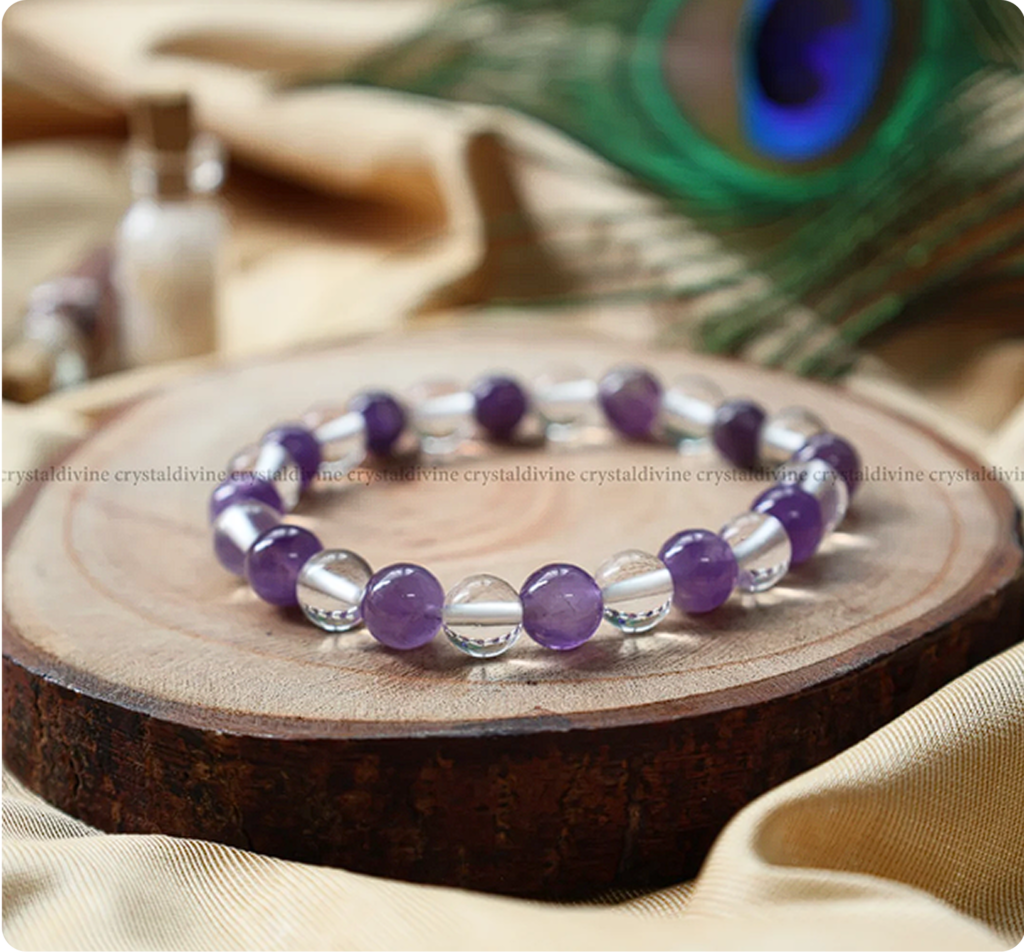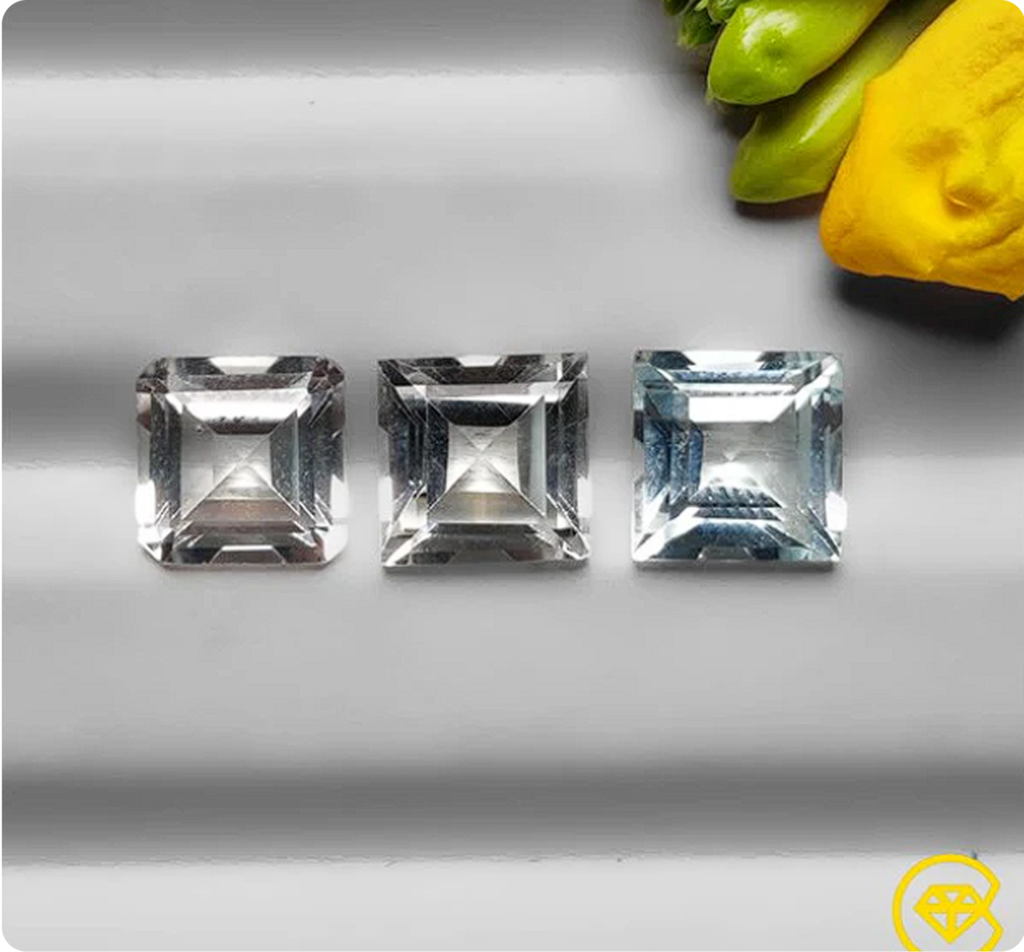
Gemstone 101 : Amethyst
Writer’s Name :
Date of Publishing :
Writer’s Name :
Arya
Estimated reading time :
If you didn’t know Dionysus was the reason why Amethyst is purple…then YOU, are in for a ride!
Hey there, welcome to Gemstone 101, the guide where we uncover everything (or at least we try to) about 1 gemstone per week and today sits on the pedestal, our very own epitome of luxury, (drum rolls) none other than- AMETHYST!
The majestic purple amethyst has captivated humanity for millennia, from ancient Greek legends to modern royal collections. This comprehensive guide explores the fascinating world of amethyst, covering its physical properties, spiritual significance, and practical care instructions.
Along with that, we’ll be dropping facts here and there to excite (or jump scare) you just like this one-
🔍 FACTS: The largest amethyst cathedral, a large amethyst geode, is the Empress of Uruguay. It is around 8 feet tall and weighs a boasting 5,000lbs (2,267kg) + It looks like this –
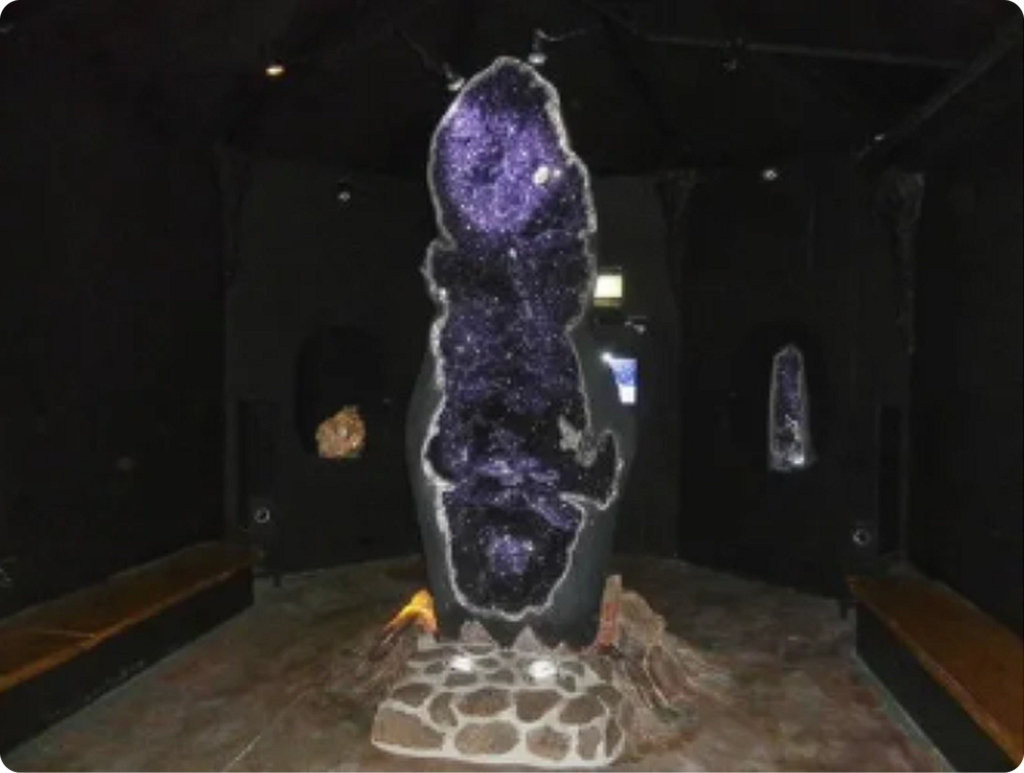
What is Amethyst & how is it formed
Physical Properties and Formation
Etymology : The word amethyst is derived from “amethystos” a Greek word meaning “not intoxicated”. Now, as per the stone’s meaning the stone has been used since ancient times to promote a sober and clear mind. In the past it has been used to overcome the problems of alcohol addiction which also translates into other aspects of your life, hence bringing you out of the state of intoxication, may it be related to any form of addiction holding you back from success.
Formation : Amethyst crystal is a variety of crystalline quartz that forms in geodes and volcanic rocks. Sometimes referred to as the silicon dioxide family, they are mainly made of iron dioxide.
When this gem forms, it is usually transparent. However, sometimes there is a cloudy look to it because of inclusions.
Amethysts come in a hexagonal crystalline structure too which makes them easy to shape for jewelry. Its stunning purple coloration results from iron impurities and natural irradiation within the crystal structure. With a hardness of 7 on the Mohs scale, amethyst offers excellent durability for everyday wear.

- 1. Geographical origin: The origin place of the stone plays a huge role in its pricing. It can significantly raise the stone’s price if it's a Siberian or Brandberg amethyst
- 2. Color : Amethysts that have a more deep and uniform color are more valuable than the rest.
- 3. Clarity: Amethysts that are eye-clean and have no visible inclusions are also priced highly.
- 4. Market demand: Market trends play a huge role in the pricing of any stone. Amethyst is however a stone that is always in trend because of its rich color and its healing properties. #always_in_demand
- 5. Carat: Larger the stone, the more valuable it is.
The 4Cs of Amethyst
Let’s have a look at the 4C’s (cut, color, clarity and carat) of amethyst.
1. Color:
Amethyst is widely known for its rich color. The mesmerizing purple hue of amethyst serves as a key indicator of its quality, value, and origin. While this purple crystal naturally occurs in shades ranging from delicate lilac to intense violet, the deeper purple varieties typically command higher market value.
Understanding Color Components
Three essential factors determine an amethyst’s color quality:
- Hue: The fundamental purple color that defines amethyst
- Tone: The variation from light to dark
- Saturation: The color’s intensity and purity
Quality Grading System
Premium amethysts are graded using a comprehensive A-system:
| Grade | Color Characteristics | Clarity | Overall Quality |
|---|---|---|---|
| AAAA | Deep, rich purple | Eye-clean | Exceptional |
| AAA | Medium to dark purple | Minor inclusions | Premium |
| AA | Pale to medium purple | Visible inclusions | Good |
| A-B | Light purple | Noticeable inclusions | Commercial |
The finest specimens, graded AAAA, showcase an intense purple color with remarkable clarity. These top-tier stones exhibit the perfect balance of depth and brilliance that collectors and connoisseurs seek. As you move down the grading scale, both color intensity and clarity gradually decrease, offering options for various preferences and budgets.
Remember, while deeper purples are traditionally more sought after, the ideal shade ultimately depends on personal preference and intended use in jewelry design.

2. Clarity:
Gemstones usually come with external and internal inclusions ( flaws ). Hence, we say that the stones with little to no inclusions are the ones that are of high quality. On the basis of clarity, gemstones can be graded as AAAA, AAA, AA, A and B grades.
Inclusions of feather, crystals, pinpoints, smaller crystals and needles can be commonly found in amethyst. Make sure to look out for these inclusions before buying your stone. Remember, lesser the inclusions the better.
3. Cut
The cut of a stone can significantly impact its value and appearance. You can find the amethyst stone in the following cuts:
- Cabochons: These are plain and smooth varieties of amethyst.

2. Step cuts: These are the cuts in which a stone has more than one layer. There are different kinds of step cuts.
2.1 Asscher Cut
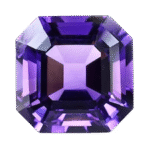
2.2 Emerald Cut
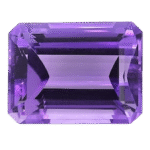
2.3 Baguette & Carre:
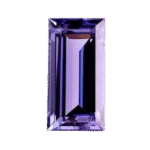
3. Brilliant Cuts: Unlike step cuts, these cuts are done with smooth edges. They are usually done keeping the stone round/oval. Here are a few brilliant cuts:
3.1 Round
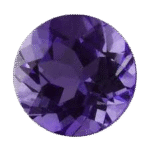
3.2 Oval
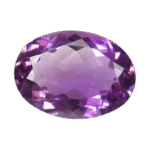
3.3 Cushion
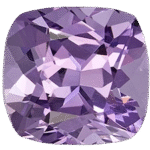
4. Princess cut ( exception cut ): It is a combination of both a brilliant cut and step cut. The layers that are given in this cut are of a brilliant cut and the side edges are kept according to step cut.
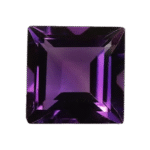
Source of all images in the CUT section : https://www.withclarity.com/blogs/gemstone/amethyst-cut
4. Carat:
Unlike other stones, amethyst’s pricing is not directly linked to its carat weight. Its pricing is usually impacted by clarity and color. Larger amethyst are rare. However, if you do get a larger stone and it is of a poor quality then it might not be as valuable. Amethyst over 5 carats are rare and hence are considered high-quality.
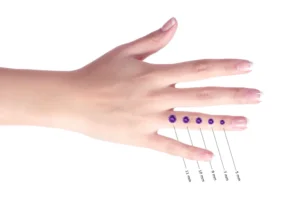
History & Cultural Significance
Ancient Connections
The story of Amethyst’s origin weaves through ancient Greek mythology, explaining both its purple color and historical significance.
The tale begins with Dionysus, the god of wine and festivities, who became enraged by a mortal’s insult. In his anger, he commanded his tigers to attack the next person they encountered. Unfortunately, that person was a young maiden named Amethyst, who was on her way to worship the goddess Diana.
To protect the innocent maiden, Diana transformed her into a pure white quartz statue. When Dionysus saw what had happened, he regretted his harsh actions. As he wept into his wine cup, his tears fell upon the crystal, staining it purple and creating the gemstone we know today.

🔍 Editor’s Take : Since the color of wine is more reddish purple, and it came directly from the god of wine himself, can also be considered a reason for the reddish purple amethyst is considered the “best” among this family, for its richness in terms of color and saturation.
This myth gave birth to the stone’s name and reputation. “Amethyst” comes from the Greek word “amethystos,” meaning “not intoxicated.” The Greeks believed wearing this purple gem could prevent drunkenness, leading to practices like drinking from Amethyst vessels during celebrations.
This ancient connection between this purple crystal and clear-mindedness continues to influence how we view this remarkable gemstone today.
🔍 FACTS : Ancient Greeks believed that amethyst could prevent intoxication. They often crafted drinking vessels from the stone to help limit alcohol consumption during feasts. This historical belief contributes to its reputation as a sobriety stone today.
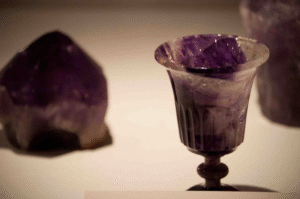
Royal Collections
Amethyst has adorned royal collections worldwide, symbolizing power and divine right to rule. Notable examples include:
- British Crown Jewels

- Russian Imperial collection

- Queen Mary’s Amethyst Tiara
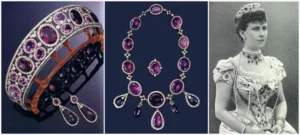
Believes & Symbolism
Amethyst’s spiritual and cultural legacy spans centuries, deeply embedded in religious traditions worldwide.
In Christian history, particularly within the Catholic Church, this royal purple stone adorned sacred artifacts and bishops’ rings as a symbol of divine authority.
The Vatican’s historical collections showcase magnificent amethyst-adorned papal rings, while Buddhist traditions embrace the stone in their meditation practices, particularly in Tibetan prayer malas (beaded garland).
Ancient civilizations attributed diverse powers to this remarkable gem. Roman commanders carried it for protection and strategic insight, while Egyptian soldiers wore it as protective amulets.
Even Leonardo da Vinci documented the stone’s virtues, noting its supposed ability to dispel evil thoughts, enhance intelligence, and bring business acumen.
Today, this rich heritage continues as modern spiritual practitioners value amethyst for enhancing intuition, relieving stress, and balancing emotions, making it as relevant now as it was centuries ago
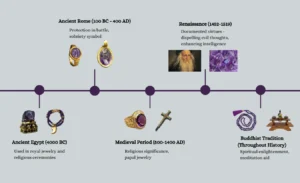
Types and Pricing
Types of Amethyst
This mesmerizing purple February birthstone comes in several other types (as if it alone wasn’t enough to make us fall in love with it). Here are some of the famous varieties of amethyst:
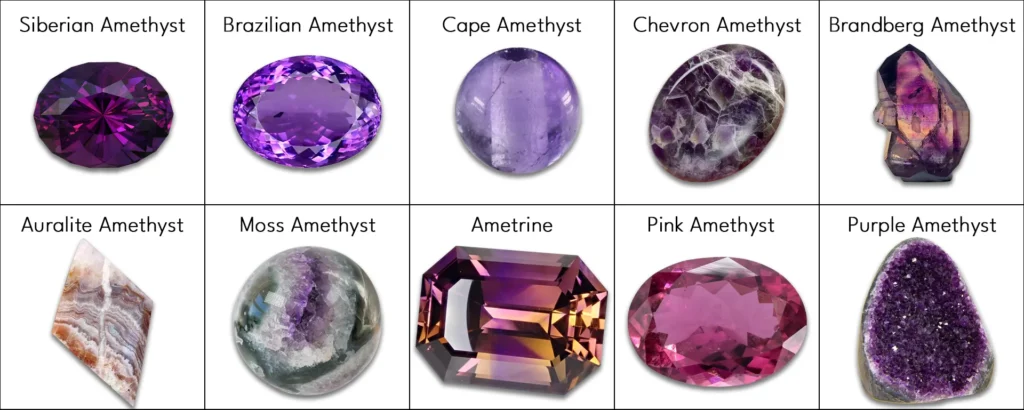
Amethyst pricing factors:
As you know, the pricing of any gemstone depends on more than just one factor. In the case of an amethyst, these are the following factors that impact its pricing:
1. Geographical origin: The origin place of the stone plays a huge role in its pricing. It can significantly raise the stone’s price if it’s a Siberian or Brandberg amethyst.
2. Color : Amethysts that have a more deep and uniform color are more valuable than the rest.
3. Clarity: Amethysts that are eye-clean and have no visible inclusions are also priced highly.
4. Market demand: Market trends play a huge role in the pricing of any stone. Amethyst is however a stone that is always in trend because of its rich color and its healing properties.
#always_in_demand
5. Carat: Larger the stone, the more valuable it is.
Pricing range:
Types of Amethyst | Characteristics | Amethyst Stone Price Range (per carat) |
Siberian | Deep purple with red/blue flashes | $50-200+ |
Rose de France | Light lilac to pink | $20-40 |
Chevron | Banded pattern | $15-30 |
Brandberg | Blend of purple, clear and smoky quartz | $100 – $300 |
Auralite | Purple with various mineral inclusions | $50+ |
Ametrine | Bi-colored stones with amethyst and citrine hues | $50 – $150 |
Brazilian | Vibrant purple | $10 – $50 |
Cape | Milky quartz with purple tones | $20 – $60 |
Moss | Inclusions resembling moss or organic patterns | $30 – $80 |
Pink | Soft pink hues | $40 – $120 |
Purple | Light lavender to deep violet | $10 – $50 |
Deep Purple | Rich uniform color | $30-60 |
Metaphysical & Spiritual Properties
Metaphysical Properties of Amethyst
Besides being an aesthetically pleasing gemstone, Amethyst is also known for its benefits for the body, mind, and soul. Hence, it is no wonder why it is regarded as the “stone of spirituality.” Let’s explore all the healing properties this purple marvel offers:
Physical benefits of Amethyst
- Reduces stress: Amethyst emits far-infrared radiation. According to some studies, this might help promote relaxation by warming the body mildly. It also aids in easing headaches and improving sleep quality. The warmth radiated by amethyst can also reduce muscle tension.
- Detoxifies body: The far-infrared radiation released by amethyst penetrates your skin. It results in the subtle warming of tissues and potentially stimulates circulation and the body’s natural cellular process. This increased blood flow and oxygenation help your kidneys, liver, and lymphatic system eliminate toxins. That is why amethyst is often used in infrared mats and therapeutic-based devices to enhance detoxification.
- Heals skin and tissues: Amethyst can help support skin and tissue health. It contains piezoelectric properties that generate tiny electric charges upon contact with heat or pressure. These charges are used in energy therapies, which are believed to improve skin and issue health through increased energy flow and cellular activity. Many massage tools made with amethyst can help boost blood flow and facilitate lymphatic drainage.
Emotional Benefits of Amethyst
- Reduces anxiety: Amethyst is also popular as “stone of tranquility,” as it is believed to promote calmness and relieve anxiety. While amethyst itself does not have pharmacological effects, the placebo effect and its calming appearance may help cope with anxiety and stress.
- Improved clarity and focus: The purple hues of amethyst can have psychological effects that promote mental clarity and focus. According to color psychology, purple stimulates the brain while fostering a peaceful state. Amethyst is believed to de-clutter the mind and enhance cognitive abilities.
- Emotional healing: Amethyst can help release negative emotions, nurturing a sense of calmness within. Mindfulness practices such as meditation performed with an amethyst stone may yield emotional benefit
🔍FACTS : FACTS : Known as the “Dream Stone,” amethyst is a powerful symbol of dream recall and intuitive connection.
Spiritual Benefits of Amethyst
- Chakra alignment: Amethyst often represents the connection between the earthly and divine universes. It is associated with the crown chakra, which governs spiritual insight and enlightenment. It also activates the third eye chakra for better intuition and psychic abilities. You can place amethyst on these chakras during meditation, which can amplify spiritual experiences.
- Protection against negativity: For ages, amethyst has been regarded as a protective stone. It is said to guard against psychic attacks and negative energies, transforming them into positive vibrations. To create a positive aura around you, clean your amethyst stone and set the intention. Then, meditate with it daily for the best results.
Astrological Connections of Amethyst
Amethyst holds deep significance in astrology, resonating with specific zodiac signs and planetary energies. Being the birthstone for those born in February, its metaphysical properties have the scope to support emotional balance, spiritual growth, and intellectual clarity. Let us understand how amethyst stone benefits the following zodiac sign associations and their astrological connections:
Planetary Rulership of Amethyst
Amethyst is ruled by Jupiter, the planet of abundance, wisdom, and higher learning. This connection aligns the stone with expansive thinking and spiritual enlightenment. Thus, amethyst amplifies these qualities, promoting a sense of broader perspective, optimism, and spiritual understanding.
Its secondary connection is with Neptune, the planet of creativity, dreams, intuition, and mysticism. In this regard, amethyst helps individuals align with Jupiter’s expansive energy while maintaining focus and grounding.
This dual planetary rulership makes amethyst a powerful tool for balancing logic with intuition.

🚨Please consult an astrologer before using any gemstone as the energy contained by these stones need to be channeled properly to yield positive effects.
Significance of Amethyst During Major Astrological Events
Amethyst’s calming and spiritual properties make it a valuable tool during key astrological events. It can help individuals to deal with the shifting energies with balance, clarity, and calmness. Here is what it does:
Mercury Retrograde: Known for causing disruptions in communication, technology, and travel, Mercury retrograde can be a stressful time. Amethyst can help balance miscommunications and calm the mind for increased clarity and patience.
You can place an amethyst near your workspace or carry it throughout this period.It can help reduce mental stress and ease misunderstandings.
Full Moon: The full moon is a time of heightened energy and illumination, often considered perfect for spiritual exploration.
During this phase, you can meditate with an amethyst to deepen your spiritual awareness and intuition. It can also provide clarity to heal emotional or mental blockages.
New Moon: The new moon symbolizes new beginnings and intention-setting.
You should use amethyst to focus on your goals and set powerful intentions during this phase. Its grounding and visionary properties make it a great companion for manifesting your dreams.
Elemental Energy of Amethyst
Amethyst embodies the energies of air, water, and, to a subtle extent, fire. This connects it to a broader range of elemental forces, enhancing its versatility in healing, mediation, and personal growth.
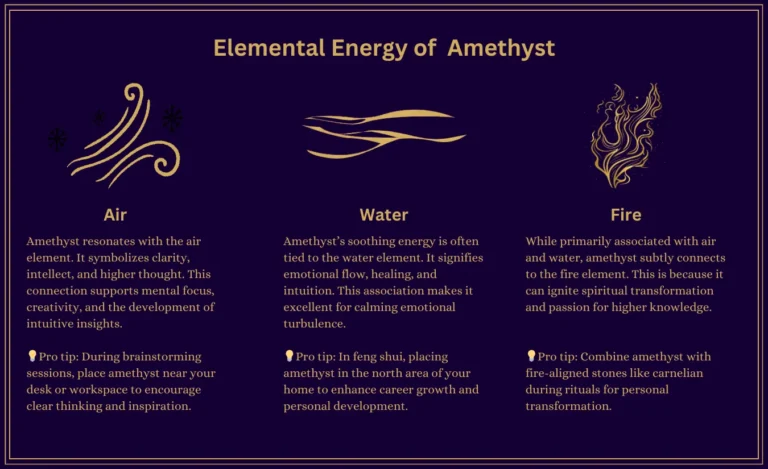
🔍 Editor’s take of Amethyst’s metaphysical property : –
”I believe the color purple represents luxury and balance, the collaboration of two worlds, the intertwining of two galaxies. From the very color theory of combining red and blue, which are known to represent two set of completely opposite and powerful feelings, red for the fire, aggression, hunger to achieve something in life and blue for the water, the stability, the satisfaction of being with what you have; purple just makes the best of both worlds blessing us with a balance.
As a human we are meant to experience all of the emotions and this color represents that in its best.
The concept is similar to that of yin and yang, there’s black in white and white in black, and that our life ain’t no black nor white, we are all existing our different shades of grey!
Let purple be the new grey, the one that adds not just hints of colors but also a deep luxury to our life. It represents our ability of doing things aggressive things (perceived wrong) with a sophistication and that to me exudes luxury.”
Stones and Metals That Pair Well with Amethyst
Amethyst can amplify its inherent qualities when paired with other stones or metals. It helps create unique synergies that are not only aesthetically pleasing but also promote healing, protection, and personal growth. Let’s explore the gemstones you can pair with amethyst.
Clear Quartz
Also known as a master healer, it amplifies the energies of any stone it is paired with. When combined with amethyst, it enhances its calming and spiritual properties.
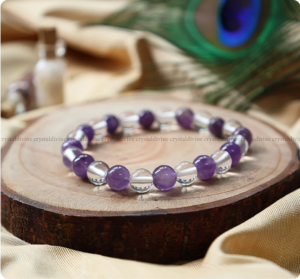
Reference clear quartz & amethyst image. Credits : Crystal Divine
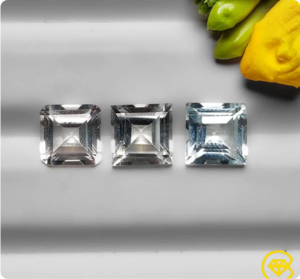
Check out our clear quartz collection here.
Rose Quartz
The soft, loving energy of rose quartz complements the spiritual clarity of amethyst. Together, they promote emotional healing, self-love, and compassion. This pairing is often called the “Divine Love Duo.”
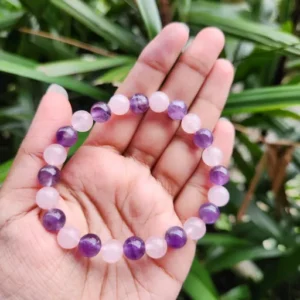
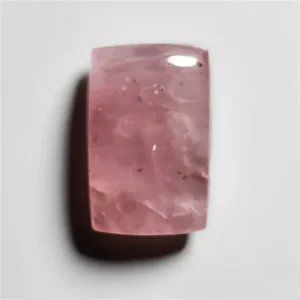
Citrine
Citrine’s fiery energy balances amethyst’s calmness. This pairing is excellent for manifesting abundance and maintaining a positive mindset.
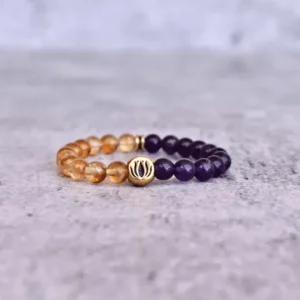
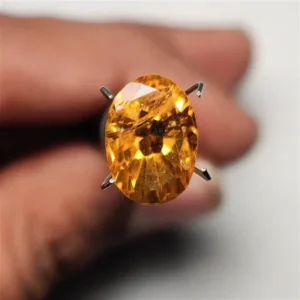
Labradorite
Labradorite is a stone of transformation and intuition. When paired with amethyst, it amplifies psychic abilities and promotes positivity.
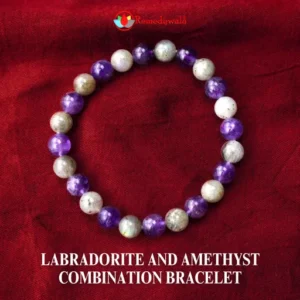
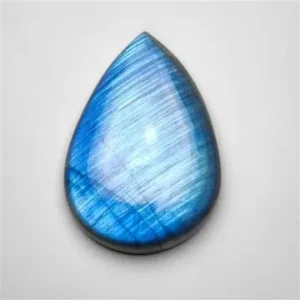
Moonstone
Moonstone enhances intuition and emotional balance, harmonizing with amethyst’s spiritual qualities. Together, they promote restful sleep and emotional healing.
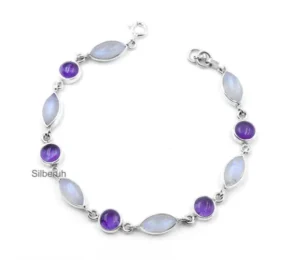
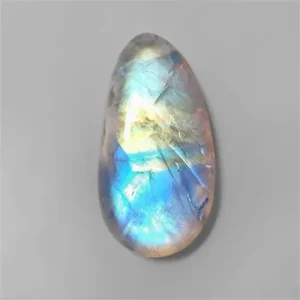
Carnelian
Carnelian’s energizing properties complement amethyst’s calming effects. This pairing can be used when working on creative projects to balance inspiration with focus.
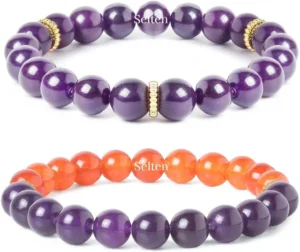
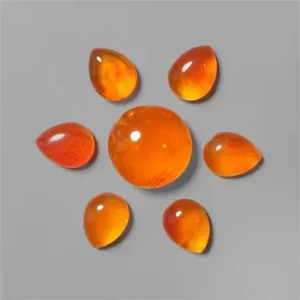
Hematite
Hematite grounds the spiritual energy of amethyst while providing stability and focus. This pairing is particularly beneficial for overcoming addictions or compulsive behaviors.
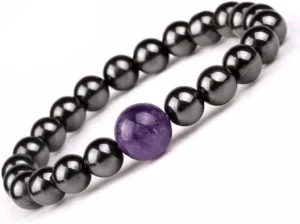
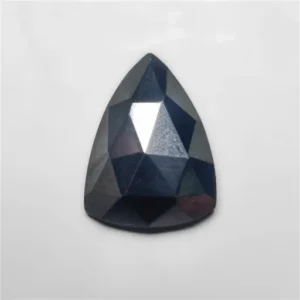
Metals That Pair Well with Amethyst
| Metals | Significance |
|---|---|
| Silver | It is believed to enhance the moon’s energy and complements amethyst’s connection to intuition and spiritual awareness. This pairing supports emotional balance and psychic protection. |
| Gold | It symbolizes wealth, warmth, and vitality, which contrasts and balances amethyst’s calming properties. This pairing is great for boosting confidence and personal power. |
| Copper | It is an excellent conductor of energy to stimulate amethyst’s vibrational frequencies. This pairing can improve energy flow and support healing processes. |
| Platinum | Its durability and purity resonate with amethyst’s high spiritual vibration. This combination is ideal for those seeking a sense of spiritual permanence and resilience. |
Care and Authentication
Care Instructions for Amethyst
Amethyst is a relatively durable gemstone, rated 7 on the Mohs hardness scale. But, it still requires specific care to avoid damage or degradation. Here’s how to keep your amethyst looking its best:
- Use warm water and a soft brush and cloth. Avoid harsh cleaning agents like bleach or acidic solutions.
- Mix a few drops of mild dish soap in a bowl of lukewarm water
- Soak your amethyst for 5-10 minutes.
- Gently scrub it with a soft-bristled brush, focusing on crevices.
- Rinse thoroughly with clean water and pat dry with a soft cloth.
Pro tip: Avoid ultrasonic cleaners for amethysts with fractures or inclusions, as vibrations may cause damage.
How to store an amethyst properly?
Store amethyst pieces separately in a soft pouch or lined jewelry box to prevent scratches from harder gemstones. Keep it away from sunlight, as excessive heat can cause discoloration or structural damage in the gemstone.
Energy Cleansing of Amethyst
Many believe amethyst holds metaphysical properties that benefit from energetic cleansing. Here’s how you can charge your amethyst:
Step 1: Place the amethyst under moonlight overnight, preferably during a full moon. Alternatively, you can place the stone on a selenite plate.
Step 2: Pass the stone through sage or incense stick smoke to clear negative energies.
Step 3: Use a singing bowl or tuning fork to cleanse vibrationally
Authentication Guide: Real vs. Fake Amethyst
With the popularity of amethyst, imitation and synthetic stones have become more common. Here’s a few tips that’ll help you when you go to buy amethyst :
- Color Real amethysts display a natural range of purples, often with subtle gradations or zoning. A uniform, overly bright purple suggests a synthetic or dyed stone.
- Clarity Authentic amethyst may have minor inclusions or natural imperfections. Completely flawless stones could be synthetic.
- Hardness test Amethyst can scratch glass or softer materials. Gently rub your amethyst against a glass surface. If it leaves a scratch, it’s likely genuine.
- Temperature test Real amethyst crystal feels cool to the touch and takes longer to warm up in your hand. If it warms quickly or feels very light, it’s likely to be fake.
- UV light test Place an amethyst under a UV light. Genuine amethyst often exhibits a faint fluorescent glow, whereas fakes may not.
- Price and source Authentic amethyst is reasonably priced, but extremely cheap stones are likely synthetic or fake.
- Refractive Index (RI) test The RI of amethyst falls within 1.54 to 1.55. Use a refractometer to confirm if the stone matches these values.
- Heat treatment Heated amethyst can turn yellow or greenish, mimicking citrine or prasiolite (a variety of green quartz). Verify with the seller whether the stone has undergone treatment.
Frequently Asked Questions
Look for natural color zoning and inclusions. Genuine amethyst crystal typically shows varying purple shades within the stone. Read more about it in this article – Identifying real vs fake Amethyst
Yes, prolonged exposure to sunlight can cause amethyst to fade, so store it away from direct light. Interestingly, many citrines in the market available are actually heat treated amethysts because citrines are rare on this planet. We have uncovered this gem blunder secrets for you in this article here – Are you buying treated amethysts in the name of citrine ?
The main value factor is color intensity and uniformity, with deep purple stones commanding higher prices. Refer to our Gem Decoded section here
You may also like


People also search for
Gemstone 101 : Amethyst
- 1. Geographical origin: The origin place of the stone plays a huge role in its pricing. It can significantly raise the stone’s price if it's a Siberian or Brandberg amethyst.
- 2. Color : Amethysts that have a more deep and uniform color are more valuable than the rest.
- 3. Clarity: Amethysts that are eye-clean and have no visible inclusions are also priced highly.
- 4. Market demand: Market trends play a huge role in the pricing of any stone. Amethyst is however a stone that is always in trend because of its rich color and its healing properties. #always_in_demand
- 5. Carat: Larger the stone, the more valuable it is.
Amethyst pricing factors:
Pricing Range
| Types of Amethyst | Characteristics | Amethyst Stone Price Range (per carat) |
|---|---|---|
| Siberian | Deep purple with red/blue flashes | $50-200+ |
| Rose de France | Light lilac to pink | $20-40 |
| Rose de France | $20-40 | Light lilac to pink |
| Rose de France | $20-40 | Light lilac to pink |
Stones and Metals That Pair Well with Amethyst
Amethyst can amplify its inherent qualities when paired with other stones or metals. It helps create unique synergies that are not only aesthetically pleasing but also promote healing, protection, and personal growth. Let’s explore the gemstones you can pair with amethyst.
Frequently Asked Questions
Look for natural color zoning and inclusions. Genuine amethyst crystal typically shows varying purple shades within the stone. Read more about it in this article – Identifying real vs fake Amethyst
Yes, prolonged exposure to sunlight can cause amethyst to fade, so store it away from direct light. Interestingly, many citrines in the market available are actually heat treated amethysts because citrines are rare on this planet. We have uncovered this gem blunder secrets for you in this article here – Are you buying treated amethysts in the name of citrine ?
General Information
Classification
10x magnification
Characteristic Physical Properties
10x magnification
You may also like


People also search for
You may also like



